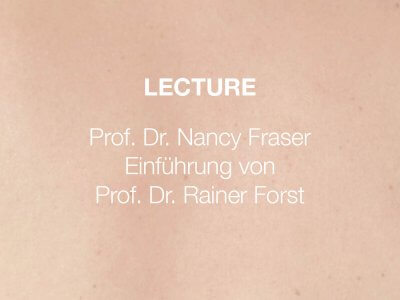Thinking emancipation – Introduction by Prof. Dr. Rainer Forst
Social struggles for emancipation are fought not least in the space of reasons. Indeed, it is only when notions about the “nature” of people that condemn certain groups to second- or third-class status change that societies can begin to transform. Patriarchy begins to shake when the justificatory narratives that, whether religiously or otherwise based, simultaneously legitimize and ideologically cement this normative order of domination starts to crumble.
At the same time, the long history of struggles for gender equality has taught us that such narratives are remarkably resilient and mutable. Seemingly overcome, they return as the idea of “natural” orders, promising support (perhaps even “cohesion”) in a society that is changing too quickly and too radically in the eyes of many. The appeal to traditional values often conceals violence against those who do not want to submit to them. In this situation, it is time to question the state of emancipation and to take a look at the political situation, also by comparing different countries. The normative orders in which we live may not be quite as far advanced in their progress as some believe; and where such has been achieved, it is at stake. As has been seen not only in the U.S. under Trump, right-wing populist movements contain complex discourses on gender issues, and not infrequently the reactionary comes across as revolutionary, as supposed liberation.
Many questions are therefore to be discussed at this conference, and the Normative Orders Research Centre at Goethe University is happy to contribute. It is important to analyze the discursive strategies and also the institutional and informal linkages of radical-conservative actors and groups, keeping in mind that the word “emancipation” itself contains some pitfalls. For at one point it can mean participating equally in existing institutions according to established rules of the game – and, according to a deeper political understanding, it can mean gaining the power to change those rules of the game. Only that is truly transformational equality – one that redefines once again the rights that are to be acquired. As Nancy Fraser shows, for example, it only helps multiply underprivileged women to a limited extent if privileges in the upper echelons of society are distributed somewhat more equally between men and women. She calls for a “Feminism for the 99%” and points out that struggles for emancipation must always be seen in a larger social, also transnational context.
We would like to thank the Frankfurter Kunstverein, especially Franziska Nori and Asia Leofreddi, for their proven cooperation at the interface of art and politics, and we would also like to thank the departments of the City of Frankfurt, namely Ina Hartwig and Rosemarie Heilig, for their support of the project. Last but not least, on the part of Normative Orders, we would like to thank the Ministry of Science and the Arts for its sustained support.


